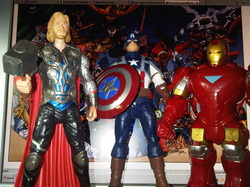 I was reminded of late that I haven’t posted a blog on my own web site for a very long time; I suspect the person making that reminder is the only faithful reader of my blog, but no matter, I have neglected my own little corner of the interwebs for far too long.
Transitions are important, I tell my students, so I need to provide some kind of bridge between my last blog post and some kind of regular posts to come. In grade school, this time-bridge is accomplished with the “what I did on my summer vacation” speech or writing assignment. Since I am feeling the press of end-of-semester duties, I think I’ll adopt the elementary strategy and share here, in summary, “what I did for the past year when I wasn’t keeping up my blog.”
1. Travel – who says scholarly activities can’t be fun?! I began last summer’s academic adventures with a trip to UCLA, where I spent a week watching some very old television at the Film and Television Archives. The research was for a chapter in my recently published book, Dreams in American Television Narratives: from Dallas to Buffy. For a small part of my research, I had to go to the Paley Center in Beverly Hills; how many scholars have to walk down Rodeo Drive to get to the source of their research, research that involves watching television? Have I mentioned how much I love my job? Topping this trip off was the opportunity to visit with my son, daughter-in-law, and grandkids.
Four days after returning home, I left again for faraway scholarly pursuits. This time the destination was Vancouver, B.C., where I traveled with two of my students to present papers at the Whedon Studies Association Biennial Conference. I had never been to Vancouver before; it is a beautiful city with a beautiful attitude. And I was there with a large group of friends/colleagues who also study Joss Whedon. Five days immersed in discussions of a favorite topic: have I mentioned how much I love my job?
There have been other trips over the year. The Popular Culture Association of the South conference in Nashville in September, and the Popular Culture Association conference in Washington D.C. last month. I traveled to D.C. with a friend who I learned is queen of the road trip, and while there I had the joy of dining with three former students who have each built impressive careers in the nation’s capital. OK, last time, have I mentioned how much I love my job?
2. Research – While completing the research and writing of the Dreams manuscript, I was also working on the Vancouver conference paper, which required me to review some of my favorite Whedon episodes from Buffy, Angel, Firefly, and Dollhouse while at the same time schooling myself on some of the finer points of anime and Asian culture. Preparation for the two PCA conferences required some focused viewing of Justified, The Walking Dead, and Supernatural. Those presentations are the building blocks for a new book-length project on the South in television. Toward that end, I am currently watching/rewatching the entire Doctor Who library for a paper I will be presenting in London this September on that show’s presentation of the American South. In the middle of all this grueling TV viewing, I am also editing a collection of Aaron Sorkin interviews for a project under contract with the same publisher of the Joss Whedon: Conversations book I co-edited with David Lavery.
3. Speaking of Television – There is some great new television out there, and even I cannot keep track of all of it. Some of my favorites over the past year have included The Following (although it may not be doing my profession many favors with its English professor serial killer), The Walking Dead (which I think continues to get better, even though that may be hard in the future without my beloved Merle), Game of Thrones (strong women getting stronger!), and Downton Abbey (I’ve surprised myself with this one as I’m not typically a fan of historical television narratives).
4. And Film – While the year’s films in total have not excited me too much, The Avengers was all it took to make this one of my favorite years in film – ever. Besides having Joss Whedon at the helm, the movie gave me some of my favorite comic characters all on one screen, and I was mesmerized. And the strategy is quite impressive: built from the individual movie stories of many of its characters, The Avengers also laid the foundation for a TV show (S.H.I.E.L.D – oh, I can’t wait!) as well as additional movies for the individual characters (Iron Man 3 – next week! Another Thor coming up!) and an Avengers sequel. There were other great films this year, Argo, Life of Pi, and Zero Dark Thirty among them, but for a superhero geek like me, there may never be another year like this one for film.
5. And family – Love my husband, sisters, mother, and children – but damn I have fun with the grandchildren. They all live far away, LA and Dallas, so the time we have with them during visits is very memorable. Went to the beach and Santa Monica Pier this year with my grandson, went to see Brave with him and the girls, and hosted my granddaughter’s first night away from mom and dad. Yes, when you are having a slumber party with grandma, you get to watch cartoons as you are falling asleep!
6. You might be a feminist if…who am I kidding; I’ve been carrying the feminist banner most of my life, but sometimes shit happens to make you want to smack that banner across ignorant heads. This year has been full of those moments, including times when female students have needed old voices like mine to speak up on their behalf. A colleague and I watered up like a couple of babies after hearing some young ladies talk as if the past 40 years never happened; as Yeats asked, “when will it suffice?” Until it does, guess I’ll have to keep waving those colors.
7. Furlough happens – well, unless something drastic changes in the next month, furlough will be happening in this family. On a bright note, what was to be a 24% cut in my husband’s pay will likely only be a 14% cut; I’m sure there will be many future rants, I mean blogs, dedicated to this experience.
8. Death happens, dammit – One of my last blogs was about the death of George Lindsey, namesake of the film festival I co-direct and a man who, through that venture, became my friend. His loss began a too-rapid string of deaths that touched me and many of my friends. George’s best pal Ernest Borgnine died the end of June; the festival had just hosted Ernie in March for the dedication of the black box theatre performance center that carries his name. The same day Ernie passed away, a former student and amazing young man died suddenly. He and his wife were doing good work, and by that I mean the work of goodness, traveling with an organization called Soles4Souls. They were at Texas A&M collecting shoes for the organization when he died. The simply amazing Dr. Bill Foster, my one-time department chair, an award willing bluegrass musician, and an Appalachian storyteller, passed away last fall. To many, too soon.
This about covers it, at least the “it” I’ll blog about. In the future, I’ll go back to the regularly scheduled (I hope) posts on television and film and politics and superheroes.
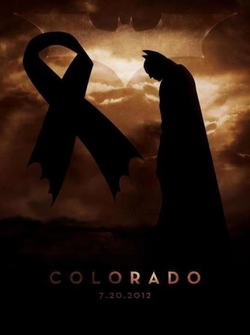 “Guns don’t kill people; people kill people.”
This is the tag line the NRA has been repeating mantra-like for years to convince us, logically they would claim, of the silliness of gun control efforts. Tonight as Americans and many throughout the globe struggle to make sense of yet another shooting rampage, some are pointing to the perpetrator’s choice of location for his rampage and his supposed Joker costume as proof that violence in movies and other media lead to such tragedies.
“Guns don’t kill people; people kill people.”
Literally, I suppose, the NRA is correct. Guns aren’t sentient; they are incapable of the passions or the psychoses that lead one person to take another’s life. But the NRA’s mantra is fallacious by proposing an either/or argument. Either guns kill or people kill. Resolving the fallacy might go something like this:
People with guns kill people.
No thing, except perhaps nature itself, kills unless under the control of a human. A bottle of vodka cannot on its own harm people. It only becomes a weapon when drunk by people. Heroin left in is natural form is not a hazard. It only becomes a menace when used by people.
In this respect, movies are not like guns or booze or drugs. You can’t pick up a movie and shoot your neighbor. Movies don’t chemically alter the human brain, making it unable to control the actions of the body. Movies, while sometimes violent, are stories we see and hear. From the cradle we are conditioned to distinguish between reality and story, between fact and fiction.
Sadly, for a few people and for a variety of reasons, that distinction between reality and fiction blurs. Yet this condition is not limited to contemporary film, television, or video games. Few films, whether presenting action, horror, or superheroes, can present anything as violent or horrifying as Grimm’s original tales (a wolf eating grandma!) or ancient Greek tales of murder and vengeance.
So I’d like to offer my own answer to both the NRA with their irrational rhetoric as well as those who once again are using fictions to explain human behavior:
Movies don’t kill people; people with deadly weapons kill people.
As we again open the national dialog about gun violence in America, I hope we remember this. We owe this much at least to the victims of today’s rampage in Aurora, Colorado.
""We impose meaning on the chaos of our lives. We create form, morality,
order. It's a choice we have to make every second of every minute of
every day."
Batman: Absolution
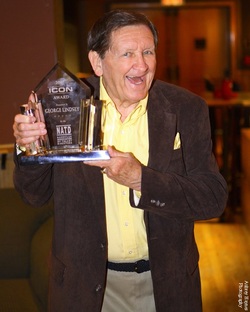 The past six years of my life have been made richer, and certainly funnier, from knowing George “Goober” Lindsey, who passed away early this morning. The star of “The Andy Griffith Show” and “Hee Haw,” as well as numerous important appearances on “M*A*S*H,” “Gunsmoke,” “The Alfred Hitchcock Hour,” and with roles in “Ensign Pulver” “The Aristocats,” and “Robin Hood,” among others, was a 1952 graduate of the University of North Alabama, where I teach. 15 years ago, he helped found an international film festival at UNA, and six years ago, I was asked to co-chair that event.
I was terrified the first time I met with George in my new capacity as co-chair of a major event which bore his name. My close friends know that beneath a well-rehearsed mask of confidence, I am afraid of my own shadow. Imagine my sitting down to try to gain this TV and film legend’s confidence. Apparently my mask was a little rigid that day, because I learned a few years later that George took to calling me “Sarge” after that meeting. Thankfully, he didn’t insist that I be fired, and we developed a lovely friendship over the years. I only wish, before he left us, that I had grown that funny bone George liked to say I was lacking.
Heaven is now blessed with George, who will be saying “hey” to friends who passed before him. The rest of us will feel the absence of George, his sweet voice saying “hey,” his knock-knock jokes, and his wonderful heart for a very long time. RIP friend.
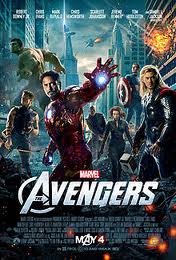 I just read a Facebook post from a filmmaker acquaintance who declared his status by saying he was not going to see The Avengers, ever, because “mindless, pointless” entertainment like Whedon’s Marvel-based story makes it difficult for real film art to have a chance. I had hoped to return to blogging with a review of The Avengers, but I feel I must instead defend a film I just returned from watching, and which I would like to declare was far from pointless.
Anyone who knows the struggle of Joss Whedon’s career knows that his lack of sustained commercial success has much to do with the depth of his storytelling. Yes, Buffy and Angel had good runs on television and developed still-faithful legions of cult fans, but they never achieved the audience numbers to be called popular favorites. Firefly and Dollhouse fared even worse. Much of the ratings problems with these shows had to do with narrative complexity, witty dialogue, and the guts to sacrifice beloved characters in the service of storytelling – in the service to making meaningful points. Regardless of lack of commercial success, Whedon’s shows are regularly referenced by those who study and write about “Quality American Television.” Simply stated, you have to have a mind to appreciate Whedon’s storytelling, which is never mindless.
For those who are staying away from the Avengers party because of preconceived notions of art, I would like to say that when placed in Joss Whedon’s hands, Marvel’s superheroes become every bit as artful as Kurosawa’s Seven Samurai, film characters Whedon is sure to have studied, carefully, as a film student as Wesleyan University under mentor (and trustee emeritus of the American Film Institute) Jeanine Basinger. Hulk’s internal conflicts are as beautifully portrayed as any art-film struggle, and the action is as good, if not better, than anything John Ford captured on film. And the dialogue, one of Whedon’s greatest talents, stands up against any Coen Brothers film. The point of it all? The point is one of Whedon’s enduring themes; not even a superhero can walk alone. Whedon has spent much of his career rewriting myths or film conventions, and one of those is the Western Hero who, while able to save the community, has no place in it. Whedon’s heroes, on the other hand, work best when they exist in community, however uncomfortable forming that community may be. This is a very feminist idea indeed, and one he is justifiable proud of. In making his points, Whedon is always at war with mindlessness, he just does it so skillfully that those points become widely accessible.
And maybe that’s why some people would like to skip The Avengers party in favor an “art” film. There might be too many regular “folk” at the party. And those regular folk might actually “get” the intelligent points built into the complex narrative and dressed in witty dialogue. If that’s what some people are afraid of, I’m sure Joss Whedon would be happy if they skipped the celebration.
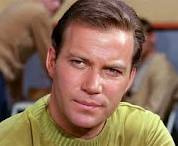 As I was cleaning off my desk at home, I unearthed a set of “Quotable” Star Trek cards my husband put in my Christmas stocking last year. Flipping through them, I was again reminded of how well Gene Roddenberry understood the human condition. Yes, the Enterprise was navigating through the stars, but the situations the crew confronted could have easily been encountered in Des Moines, Iowa or Birmingham, Alabama. The dialog written for the characters is just as universal, and timeless …
…for instance, in “The Corbomite Maneuver,” Captain Kirk says, “There is no such thing as the unknown, only things temporarily hidden, temporarily not understood.” Inherent in “temporary” is the idea that humans aspire to unhide, to understand, to know. This is the same drive Tennyson gives his version of Ulysses, who desires “To follow knowledge like a sinking star, Beyond the utmost bound of human thought.”
While the current rate of technological change may indicate this drive is active in the 21st Century, I worry that technology may be the only area where people, like Ulysses, are focusing unyielding aspiration for knowledge. Semester after semester I introduce students to works of literature they “don’t understand,” yet few of them have a real desire to do so. What they really want is a one sentence summary, not real understanding. I hear the same thing from my colleagues throughout the humanities. And what saddens me the most is that like Roddenberry’s characters, I know that knowledge of human beings, not machines, is the great hope for our universe. So, like every semester, I will go into my classroom with the hope that together my students and I will strive to unhide, to understand, to know.
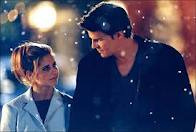 I am aware that it is two days past Christmas and two days past the date I should have posted number 25 in my Top 25 Christmas Episodes list. While a lot of life has gotten in the way of my posting these entries on schedule, this delay was planned. I’ve timed this to go along with an even more important event going on over at my friend Nikki Stafford’s bog (nikkistafford.blogspot.com), the final installment of the Great Buffy Rewatch of 2011. Any ideas about what my top Christmas episode is??? On December 15, 1998, the Buffy the Vampire Slayer episode “Amends” showed us that religious hasn’t cornered the market on forgiveness, that even those who claim no God can believe in the power of forgiveness, an act that creates reconciliation. Joss Whedon is one of those people who, while an atheist, believes that humans themselves have the potential for great goodness, and it is shown in almost every moment of “Amends.” While haunted by the most powerful form of evil, Angel shows that love has more power and is willing to sacrifice himself for that love. Oz’s love for Willow gives him the power to resist another form of temptation. Love motivates the goodness of the living and the undead, then, and that love, especially in Angel’s case, is the “amends” that compensate for the truly terrible acts of Angelus, which have been haunting Angel in his dreams. As proof of this, Angel’s sacrifice is rejected by a true Christmas miracle… …which is what makes “Amends” my favorite Christmas television episode. While the holiday is an observance of a supernatural miracle, we should always remember that miracle was an act of love, and love is not limited to those of religious faith. We all fall short of whatever standard our faith sets for us or we set for ourselves, but with love, all can be forgiven. For more of this love and goodness, visit Nik at Night; there will be a lot of it as the Great Buffy Rewatch comes to an end.
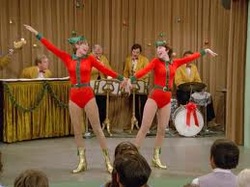 Once upon a time (33 years ago), in a city far, far away (Montery, California), a certain soldier who is now a college professor joined with a few other soldiers to sing Christmas carols at the Fort Ord base hospital. When we arrived, we were directed to the psychiatric ward as that was where the most patients could be found to enjoy our gleeful singing. I remember feeling very cautious since I had never been to the floor in a hospital that doesn’t typically even have a number in the elevator. The most vivid memory I have is of one patient, perfectly harmless, who followed us from room to room requesting his favorite Christmas carol, “God Bless America.” We must have belted out his “carol” ten times that evening.
A year or so earlier than this experience, a couple of my two favorite TV characters from the period, Laverne and Shirley, had a similar Christmas visit to a psychiatric ward. I didn’t see the episode until much later, probably on Nickelodean, and it gave me quite a chuckle, mostly because of its similarity to my own experience. On its own, however, Laverne and Shirley’s second season “Oh Hear the Angels’ Voices” is a delightful Christmas episode. The two wacky friends try to do something good, it backfires on them (Shirley’s parents had used the threat of a mental hospital as a discipline tactic when she was a child), and as is often the case in a Christmas show, the episode ends on a fuzzy note with viewers knowing that we should all do something equally giving at Christmas.
I think since I have already caroled at a psychiatric ward, I’ll try a different charitable activity this Christmas ….
One more episode on the Christmas list. Anyone want to take a guess which it will be?
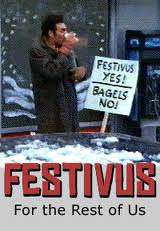 Whew! I finally got to Festivus. It’s not Chistmas, and it’s not Hanukkah, but it has become an important part of popular culture, and it is fun to say!
Most people were introduced to Festivus in the Seinfeld episode, “The Strike.” While it was actually created in the 60s, Festivus wasn’t widely known until Seinfeld writer Daniel O’Keefe, son of the holiday’s creator Dan O’Keefe, incorporated it into “The Strike.”
Festivus is a great holiday, mostly because it is just so darned honest. You get to tell people how much they have failed you in the “airing of grievances.” Then you get to wrestle! If we all celebrated Festivus on December 23, we’d be free of emotional baggage and have a much merrier Christmas.
“The Strike” is a great holiday episode, not only for the brilliant way it weaves so many stories together (George’s holiday greed, Kramer’s 12 years of unemployment, Jerry and Elaine’s continued dating drama), but because it introduced us to an idea that has become not only so culturally familiar, but culturally celebrated! Who says pop culture is useless!
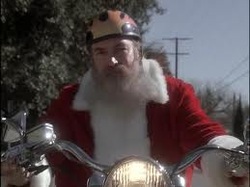 Yes, I know I’m running three days behind on my Top 25 Christmas Epsiodes list. Christmas has gotten in the way of the Christmas list, but as the mushrooms simmer in red wine and the sticky buns rise, I’m going to try a little catching up.
Six Feet Under always had a snarky undertone (and sometimes explicit tone), and “It’s the Most Wonderful Time of the Year,” the program’s 2002 Christmas episode (airing in April…what is it with April Christmas episodes on HBO?), is no exception. The death of the week is a Hells Angel who crashed while waving to some children on the street as he was going to a job playing Santa. It’s a Hells Angels kind of Christmas as the Fishers agree to open the funeral home to Jessie’s friends on the holiday for a send-off celebration.
Ruth Fisher is trying to bring some celebration to her own family’s Christmas, the one-year anniversary of her husband’s death. As always where patriarch Nathaniel is involved, much backstory is revealed to the viewers, but in “It’s the Most Wonderful Time of the Year,” characters also reveal secrets to each other, which provide some nice parallels in the narrative.
For many people, the holidays require a lot of extra emotional energy to rise above the family tensions, especially if Christmas is going to truly become “the Most Wonderful Time of the Year.” A robbery and two broken legs put Nikolai on the Fisher sofa for Christmas, compounding the Fisher’s family stress. Fisher stress usually makes for the best Six Feet Under episodes, and “It’s the Most Wonderful Time of the Year,” is no exception…it is a Most Wonderful Christmas episode.
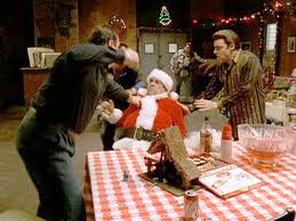 As the last holiday of the year before the New Year celebrations, and since it is a time for family gatherings, for better or for worse, Christmas becomes a time of reflection. In no television episode is this presented more clearly than today’s subject, The Sopranos “…To Save Us all From Satan’s Power.”
Family is big for Tony Soprano, in their multiple forms, so it makes sense that Christmas is a time when Tony is particularly sensitive to family issues. “…To Save Us all From Satan’s Power” airs one year after Tony is forced to take out his good friend, Big Pussy. Flashbacks help build the guilt Tony is carrying, which is confirmed by his asking Paulie Walnuts if he feels any guilt over killing Pussy after learning he was an FBI informant. The flashbacks also provide Tony with important information about Pussy’s “mole” activities, including his wearing a wire at the previous Christmas party at which he put on a Santa suit for his annual playing of Santa. One of the brilliant qualities of The Sopranos is its ability to make us feel bad for its brutal, criminal lead character, and this is one of those times.
There is nothing he can do about Pussy, but Tony makes up for it by trying to “save” his own family members. He gifts his sister Janice with the beating up of the Russian who injured her in an earlier episode. He beats up Jackie Aprile, Jr., Tony’s daughter’s current love interest and son of his dead best friend, when he sees Jackie getting a lap dance at a strip club. His loyalty and adherence to his own admittedly immoral code of honor make Tony even more endearing, in a very uncomfortable way.
One of the highlights of this episode is Bobby Bacala taking over Big Pussy’s role as Santa for the Satriale’s Christmas Party. Bobby has the size to pull off Santa, but not the personality. His painful shyness in the role prompts Silvio to suggest that they send him to Santa school before the next holiday. Another highlight, and perhaps the truly “highest” moment in “…To Save Us all From Satan’s Power” is the gift Tony receives from his daughter, Meadow – a Big Mouth Talking Bass. Viewers will remember that one of Tony’s clues about Pussy’s disloyalty came through a fever dream when Pussy appears to Tony as a talking fish. And Pussy is now “sleeping with the fishes.” Meadow doesn’t know any of this, of course, which gives the moment much irony. The true implication of the gift is only apparent to Tony and the viewing audience, making it one sizable and painful inside “joke.”
“…To Save Us all From Satan’s Power” embodies all the reflection and family centric qualities of a Christmas episode – but it did not air during the holidays. It first aired in April, 2001. Perhaps this was best since it so wonderfully captures the complex emotions of Christmas, many of which make celebrating difficult. So while I count it as one of my top 25 Christmas television episodes, you might want to wait until after the holidays to watch or re-watch it.
|











 RSS Feed
RSS Feed